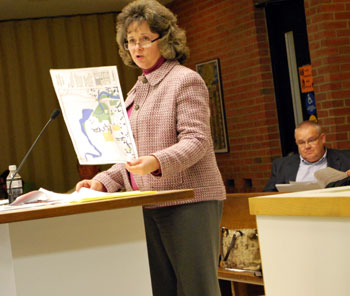Waste as Resource: Ann Arbor’s 5-Year Plan
Initially scheduled for consideration earlier this summer, a new five-year solid waste plan may now see action by the Ann Arbor city council sometime this fall, according to solid waste manager Tom McMurtrie.

The Recycle Ann Arbor booth at the annual Mayor’s Green Fair held this year on June 14. The relative size of the containers reflects the goals for the amount of compostables, recyclables and material to be landfilled. (Photos by the writer.)
The council will be asked to adopt a draft plan that includes a number of initiatives, including goals for increased recycling/diversion rates – generally and for apartment buildings in particular. A pilot program would add all plate scrapings to the materials that can be placed in the brown carts used to collect compostable matter.
And if that pilot program is successful, the plan calls for the possibility of reducing the frequency of curbside pickup – from the current weekly regime to a less frequent schedule. Also included in the draft plan is a proposal to relocate and upgrade the drop-off station at Platt and Ellsworth. The implementation of a fee for single-use bags at retail outlets is also part of the plan.
City staff had originally intended to place the adoption of the solid waste plan on the council’s legislative agenda much earlier than this fall. The work on updating the plan had already begun over 18 months ago, in January 2012. And a bit more than a year later, on Feb. 28, 2013, the city’s environmental commission had voted to recommend that the city council adopt the plan.
This article begins with a look at one reason for the delay – which was not related directly to the plan itself. That’s followed by a brief look at the solid waste fund, which pays for the collection of trash, recyclable materials and yard waste.
Revenue to the fund is then considered in terms of the idea that solid waste is a resource, something that’s reflected in the title of the proposed update to the city’s solid waste plan: “Waste Less: City of Ann Arbor Solid Waste Resource Plan.” In particular, this report looks at a recent $2.50/ton negative impact the fund recently needed to absorb – due to the cancellation of a contract with the company that was purchasing the recycled glass product from Ann Arbor’s materials recovery facility (MRF).
Even though prospects for replacing the contract with a different buyer appear good, the cancellation of that contract highlights a significant consideration: Waste collection services in a local municipality depend in part on revenues that are subject to market forces that can lie beyond the direct control of that municipality.
So one section below takes a look at prospects for developing more influence on the markets – at the level of state economic development efforts. That includes the unintended negative impact that an expansion to the state of Michigan’s bottle bill could have on revenues to local MRFs. One argument for the bottle bill’s expansion is that it will reduce litter from newer types of containers. That’s also one argument for the possible local plastic bag fee recommended in the draft solid waste plan.
Beyond financial viability, success is also defined in the five-year plan partly as increased “diversion rates.” So this report also looks at that statistic and what it actually means. [Full Story]




